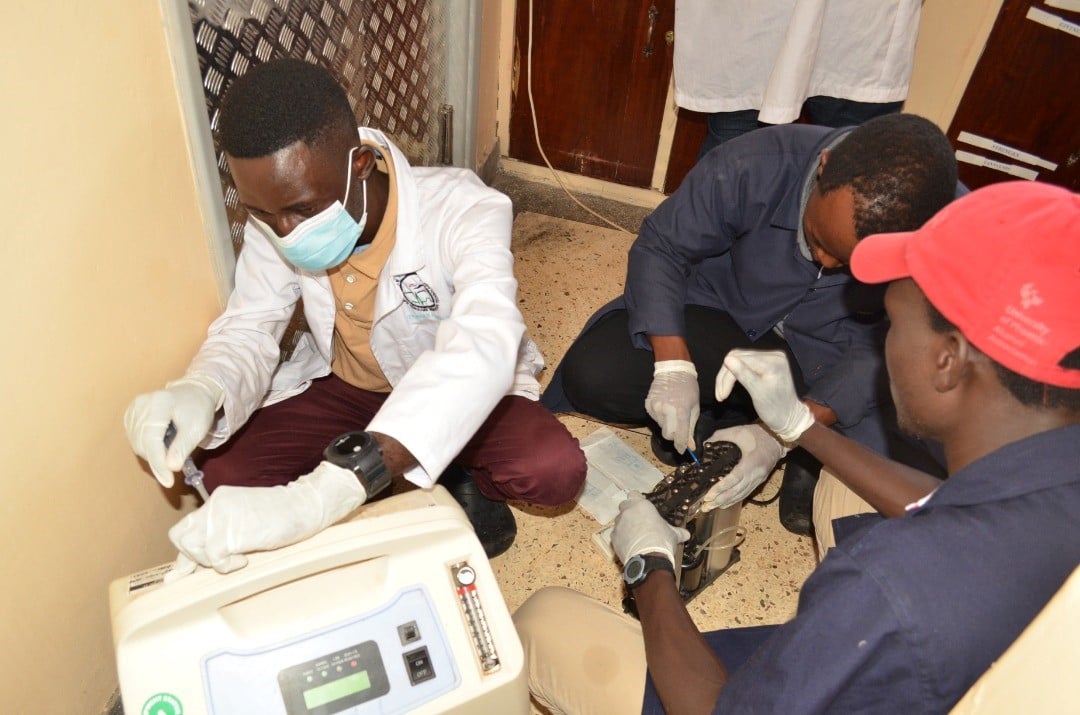Relief for health facilities as students fix equipment

Biomedical engineering students from Kyambogo University repaire medical equipment at Kalangala Health Centre IV on April 22, 2022. PHOTO/SYLVESTER SSEMUGENYI.
What you need to know:
- Masaka Sub-region, which comprises nine districts, has only two biomedical engineers.
A number of health facilities in Masaka Sub-region are stuck with faulty medical equipment which authorities say has affected service delivery, Daily Monitor has established.
This, authorities say, is due to lack of biomedical engineers in the sub-region.
This publication has learnt that Masaka Sub-region, which is composed of nine districts, only has two biomedical engineers who are both stationed at Masaka Regional Referral Hospital.
Dr Happy Tukirinawe, the Rakai hospital medical superintendent, said: “We need more engineers to repair the machines because the few who are available cannot serve the entire sub-region,” Dr Tukirinawe said in an interview on Monday.
Dr Tukirinawe said he could not accurately estimate the cost of repairing the faulty equipment because the engineers do the repairs at the expense of the Ministry of Health.
It is against this background that finalist students of mechatronics and biomedical engineering from Kyambogo University last week offered to repair some of the faulty medical equipment at various health facilities in the area.
Mr Francis Moses Ochen, the president of Kyambogo University Mechatronics and Biomedical Engineering Students, said the exercise was funded by the university under the internship programme.
“We partnered with Ministry of Health through the Masaka Regional Equipment Maintenance Workshop. The exercise will be continuous every year where finalist students will be visiting selected health facilities to gain hands-on knowledge and skills in their field of study,” Mr Ochen said.
He said his team visited hospitals such as Lyantonde, Rakai, and Kalangala Health Centre IV where they managed to repair more than 100 medical equipment.
“During our visit, we realised that the most damaged equipment were oxygen concentrators, anaesthesia machines, operating tables, autoclaves, theatre lights, weighing scales, air conditioners and fridges. We could not repair all but managed to fix some,” Mr Ochen said.
He advised government to ensure that biomedical engineers and technicians are available at all district hospitals.
At Kalangala Health Centre IV, the most affected department was the theatre where equipment like sight lighting, operation tables, microscopes, surgical diathermy, geneXpert machines, sterilizers, and suction (aspirator) machine were found to be faulty.
Dr Samuel Mugisha, the officer-in-charge of Kalangala Health Centre IV, said: “The operation theatre is a very key section of the facility and if there is any faulty machine, it completely puts all work at a standstill.”
He said the student interns helped to repair all faulty equipment in the theatre and also fixed some broken beds in all wards.
At Rakai General Hospital, the students repaired oxygen concentrators, air conditioners, microscopes, and patient monitors.
Dr Fred Tumusiime, the medical superintendent of Lyantonde Hospital, said the interns repaired the faulty Blood Pressure (BP) machine, delivery beds and the pulse oximeter.
“They also fumigated all the wards as well as rearranging our theatre, we are grateful for what the student interns did for us,” he said.
Compiled by Al-Mahdi Ssenkabirwa,Sylvester Ssemugenyi, Ambrose Musasizi, & Kenney Kakembo




